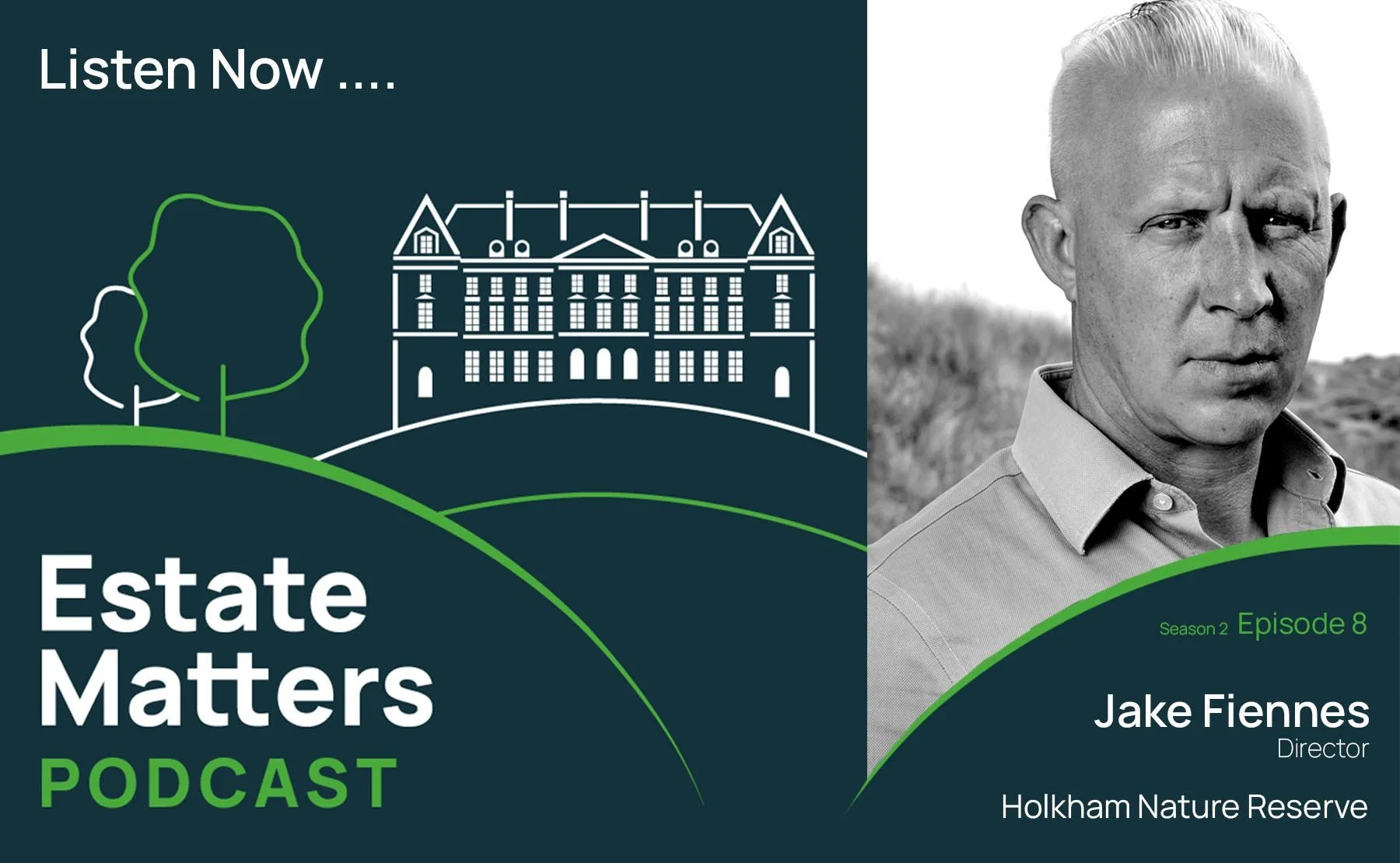Estate Matters S2 Ep8: Jake Fiennes | Productive and protective - How to communicate conservation
Jake Fiennes, one of Britain’s most high profile and in-demand conservationists, tells the latest edition of KOR Communications’ Estate Matters podcast that the UK needs a natural capital ‘Domesday Book’ to accurately measure the nation’s flora and fauna.
The Director at Holkham Nature Reserve in North Norfolk, part of the 25,000-acre Holkham Estate, believes a long-standing failure across the countryside to monitor and measure nature needs to change if we are to reverse declines.
Jake, who has worked as a land manager for 35 years, came to Holkham from the Raveningham Estate in November 2018. He tells podcast host Anna Byles that understanding the nature we have is the first step towards improving it.
“That wonderful phrase: ‘One of the most nature depleted countries in the world,’ frustrates me slightly because we haven’t had the natural capital Domesday Book that measures what we do have.” Jake says.
He accepts there have been declines in species. But he believes a national database which demonstrates what we do have would act as a baseline for data which land managers, farmers, gamekeepers, gardeners and others with a role in caring for the landscape could make use of.
“I think the recording and the reporting of nature is just something that doesn’t happen,” he tells Anna. “I’m trying to create a tool at Holkham where we measure and monitor natural capital and its really simple - it’s something that anyone can use.”
Holkham, which includes Holkham Hall, Holkham Park, the National Nature Reserve and miles of sand dunes and beach, attracts more than a million visitors a year who need to be reminded, through careful messaging, to tread lightly, keep dogs under control and respect the landscape.
Jake says: “One of the key things, because the visitor facing business is quite an important part of Holkham, is actually bringing nature to people and getting people, when they get out of their cars, to see nature.
“In winter we have over 200,000 over-wintering birds and we want people to be very close to them. We have widgeon, a winter migrant, feeding within feet of people’s cars, so people can get very, very close to nature.”
That engagement with wildlife and the natural world inspired Jake’s interest in the environment from a young age and has fuelled his work ever since. He’s a strong believer that balancing productive land use like farming and forestry with enhancing nature is possible – but it needs compromise and consultation.
He says successive government policies over centuries have had a major effect on the landscape and in many cases have been the cause of the decline of nature but that new initiatives, including the Land Use Framework, which is due to be published this summer (2025), can help reverse those losses.
“I was at the launch of the Land Use Framework,” Jake says. “I think it’s welcomed, by most people. I think Government is very cautious that it’s not a policy document. It’s basically a roadmap and a guideline to where you might repurpose land, where you might have sustainable intensification of food production; where we protect water, where we increase our protection of peat. I think it will be a very broad set of guidance for landowners and farmers.”
Jake believes policymakers will continue to drive changes in land use with schemes, like the recently scrapped Sustainable Farming Incentive (SFI), already impacting on farming methods, bringing benefits for nature. A replacement scheme is now being launched.
Jake’s ideas for creating a thriving landscape in which farming, forestry, and other land uses can work hand-in-hand with improving the natural world are explored in his book, Land Healer, How Farming Can Save Britain’s Countryside, published in 2022.
He says he had no intention of writing a book but the US magazine and website, The New Yorker wrote a 10,000-word article on his work at Holkham and within days he had been contacted by a number of publishers urging him to get his own words into print.
The book, which he describes as “part memoir, part manifesto” has, he believes reached its target audience of policymakers, civil servants, farmers and land managers. He says: “Daniel Zeichner (The Farming Minister) said last summer he was taking it on holiday with him because he had purchased it in the House of Commons bookshop.”
As well as influencing those who make policy, Jake hopes the book will provide some belief and inspiration for people that we can bring back depleted wildlife and restore damaged habitats as has been demonstrated by the team at Holkham. His thought-provoking social media posts, generally illustrated with a beautiful photograph, are intended to achieve the same outcome.
Jake says he is sometimes criticised for taking a relentlessly positive view and admits: “driving around with me, I’m just shouting at you in the car going: “Butterfly! Bird! Flower!”
Ultimately, he believes private landowners hold the key to the improvement of large parts of the landscape for producing food, providing space for leisure and access and giving a home to nature.
“Fundamentally it’s about people recognising nature where they live and work...that’s something I’d like to achieve in the next five years,” he says.

